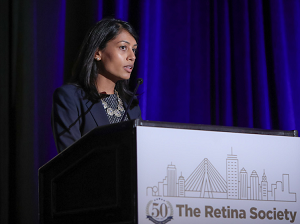
The Duke scientific research program is oriented toward the development of future leaders in the vitreoretinal field. Fellows are often sub-investigators and research training plays an important part in our fellowship and each rotation includes dedicated research time, which is a unique feature of our program. Every Fall, fellows present a research plan for feedback from the entire retina service, including clinical and research faculty, fellows, and a dedicated statistician. Ten months later, the research results are presented to the entire Department and typically generate one or more publications. Fellows are also encouraged to present their research at meetings of the ARVO, ASRS, AAO, Retina Society, and Macula Society (and are often nominated for high profile research awards).
Administrative research opportunities are available for those fellows who are interested in future administrative roles since many of our VR faculty hold significant administrative leadership positions.
The opportunities for clinical and basic science research abound and range from simple case reports to retrospective reviews of clinical or reading center data, co-editing textbooks, new instrument or device design, basic science laboratory or animal investigation, industry collaboration, and involvement in prospective trials. Fellows have obtained co-patents with VR faculty through the Duke Translation and Commercialization or through the Duke Law Start-Up Ventures Clinic. Translational and multidisciplinary avenues are available as well as collaboration with the Duke OCT Reading Center led by Glenn Jaffe, MD or with Duke Biomedical Engineering, and many other laboratories throughout this top institution.
Participation in preparation for Institutional Review Board approval as well as clinical research ethical training is also facilitated.
The Clinical Research Unit facilitates ethics training prior to engaging in research and can support fellows as they navigate the process of Investigational Review Board review.
Duke Eye Center has historically been, and continues to be, a main study site for many investigator-initiated and industry-sponsored multi-center clinical trials. Although these trials are generally under the auspices of a retina faculty primary investigator, fellows often have the opportunity to play an active role in such clinical trials. With several clinical trials ongoing at any given time, the fellow can gain a firsthand understanding of clinical trial operations and procedures.